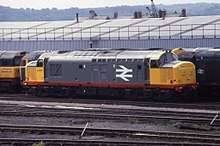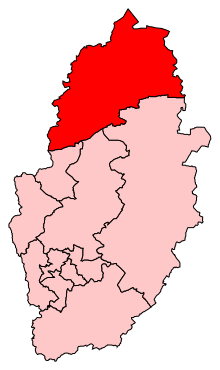Joe Ashton
| Joseph Ashton | |
|---|---|
| Member of Parliament for Bassetlaw | |
|
In office 31 October 1968 – 7 June 2001 | |
| Preceded by | Frederick Bellenger |
| Succeeded by | John Mann |
| Personal details | |
| Born |
9 October 1933 Sheffield, West Riding of Yorkshire |
| Nationality | British |
| Political party | Labour |
Joseph William Ashton OBE (born 9 October 1933), usually known as Joe Ashton, is a British Labour Party politician who was known for his defence of the rights of Labour Members of Parliament (MPs) against the demands of the left-wing of the party to subject them to mandatory reselection. He took his seat in a by-election, winning a 1.72% majority and — in his last election four years before retiring — won it by 36.4% majority, in 1997.
Early career
Ashton was born and brought up in Sheffield; he attended High Storrs Grammar School and Rotherham Technical College.[1] He was a Sheffield City Councillor for some time until his election.
Becoming an MP in 1968
He was first elected as the Member of Parliament for Bassetlaw in a by-election in 1968, when he struggled hold the seat (Labour since 1929) at a time when the government of Harold Wilson was unpopular. Explaining the return to close marginal seat status: his 1.72% majority, the previous MP Captain Fred Bellenger in local newspapers, and in Labour canvassing, was assessed to have built some personal goodwill vote from the 1940s onwards. He died mid-term aged 73 in May 1968. He had just been awarded the freedom of Worksop two days before his death.[2] Bellenger was among those deselected for any future election however for defying the party whip for his support of: the purported continued government of the White Rhodesians (see Zimbabwean independence and General Robert Mugabe) and continued privatisation of steel (abolished 1967), see British Steel Corporation.
Pit closures were an important issue in a seat with a large mining sector vote. Ashton argued that the Labour government's approach, which included redundancy payments to miners over the age of 55, was better than the terms of the Conservatives when they were in power (1951-1964).[3]
1970s

In 1974, when corruption allegations about MPs were circulating, Ashton gave an interview to the Labour Party newspaper Labour Weekly. Seeking to defend MPs in general, Ashton insisted that the number who were guilty of corruption "could be counted on the fingers of one hand". This statement backfired, as newspapers demanded that he name the guilty five MPs.
In the late 1970s, Ashton served as a junior minister in the government of James Callaghan.
In 1977, Ashton published Grass Roots,[4] a novel about a tough steelworker who becomes a rebellious Labour MP. The Times called it "the clearest guide to British party politics since Phineas Finn", while The Guardian said it was "packed with detail, as rich as a slice of fruit-cake, and as vivid and exciting as an eve-of-poll rally". After his party went into opposition in 1979 he was among Labour backbencher columnists in the Daily Star.
Ashton saw himself as the shop steward for the Parliamentary Labour Party. When left-wing activists in the party demanded that sitting MPs submit themselves to their local party members for re-selection in each Parliament, he made a strong speech at the Labour Party conference expressly pleading to save the jobs and livelihoods of Labour MPs. He pointed to infighting suiting the Tories and the large number of Labour MPs who had died of stress-related illness and linked that to pressure from their local parties.
Later life
In March 1999, Northamptonshire's Chief Constable noted that Ashton had given misleading information to officers when in the same premises of the arrests of the perpetrators of immigration and sexual offences at a Northampton Thai massage parlour. This occurred during a police raid in November 1998. He was interviewed voluntarily and not accused of committing any offence. Ashton threatened to raise a data protection complaint. The police robustly denied that it had leaked Ashton's name; its publicly statement stated "there were a great many other people with knowledge of this case - defendants, witnesses, legal representatives, other organisations and other individuals."[5] A director of Sheffield Wednesday football club since 1990, he resigned as a director shortly after his presence there was published.[6]
Following his retirement at the 2001 general election, he was succeeded by John Mann. In 2007, Ashton was appointed an OBE.[7]
Ashton was interviewed in 2012 as part of The History of Parliament's oral history project.[1][8] His memoir, Red Rose Blues, was published in 2000.[9]
References
- 1 2 "Oral history: ASHTON, Joe (b.1933)". The History of Parliament. Retrieved 14 July 2016.
- ↑ "Obituary: Mr Frederick Bellenger Labour MP and former Secretary of State for War Mr Frederick Bellenger Labour MP and former Secretary of State for War". The Times. 13 May 1968. p. 12.
- ↑ Chartres, John (23 October 1968). "Miners key to Bassetlaw". The Times.
- ↑ Grass Roots (Quartet Books)
- ↑ Waugh, Paul (17 March 1999). "Chief constable: MP was in sauna". The Independent. Retrieved 15 August 2017.
- ↑ "Massage parlour MP 'not resigning'". BBC News. 28 March 1999. Retrieved 15 August 2017.
- ↑ "Who's Who". www.ukwhoswho.com.
- ↑ "Joe Ashton interviewed by Henry Irving". British Library Sound Archive. Retrieved 14 July 2016.
- ↑ Hoggart, Simon (28 October 2000). "Doctor, I think I'm a pair of curtains". The Guardian. Retrieved 15 August 2017.
External links
- Hansard 1803–2005: contributions in Parliament by Joe Ashton
- Interview BBC Radio Four, 17 July 2009.
- Joe Ashton interview at History of Parliament Online
| Parliament of the United Kingdom | ||
|---|---|---|
| Preceded by Frederick Bellenger |
Member of Parliament for Bassetlaw 1968–2001 |
Succeeded by John Mann |
